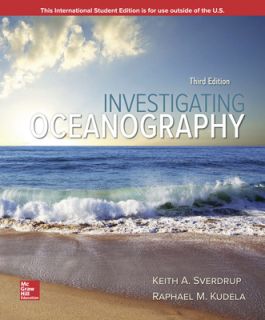Investigating Oceanography ISE
3rd Edition
1260568768
·
9781260568769
© 2020 | Published: May 1, 2019
This introductory oceanography text is intended to teach students the tremendous influence oceans have on our lives. They are encouraged to look at oceanography as a cohesive and united discipline rather than a collection of subjects gathered under a…
Read More
After purchasing your eBook, login to the McGraw Hill Bookshelf website and redeem the access code from your order confirmation email.
- Access your eBook online or offline
- Easily highlight and take notes
- Fully searchable content
- Syncs across platforms
NOTE: eBook purchase does not include Connect homework or adaptive SmartBook assignments
Prologue: The History of Oceanography
1 The Water Planet
2 Earth Structure and Plate Tectonics
3 The Sea Floor and Its Sediments
4 The Physical Properties of Water
5 Seawater
6 The Atmosphere and the Oceans
7 Ocean Structure and Circulation
8 The Waves
9 The Tides
10 Coasts, Beaches, and Estuaries
11 The Living Ocean
12 The Plankton, Energy, and Food Webs
13 The Nekton: Swimmers of the Sea
14 The Benthos: Living on the Sea Floor
15 Environmental Issues
16 The Oceans and Climate Disruption
2 Earth Structure and Plate Tectonics
3 The Sea Floor and Its Sediments
4 The Physical Properties of Water
5 Seawater
6 The Atmosphere and the Oceans
7 Ocean Structure and Circulation
8 The Waves
9 The Tides
10 Coasts, Beaches, and Estuaries
11 The Living Ocean
12 The Plankton, Energy, and Food Webs
13 The Nekton: Swimmers of the Sea
14 The Benthos: Living on the Sea Floor
15 Environmental Issues
16 The Oceans and Climate Disruption
4 The Physical Properties of Water
5 Seawater
6 The Atmosphere and the Oceans
7 Ocean Structure and Circulation
8 The Waves
9 The Tides
10 Coasts, Beaches, and Estuaries
11 The Living Ocean
12 The Plankton, Energy, and Food Webs
13 The Nekton: Swimmers of the Sea
14 The Benthos: Living on the Sea Floor
15 Environmental Issues
16 The Oceans and Climate Disruption
6 The Atmosphere and the Oceans
7 Ocean Structure and Circulation
8 The Waves
9 The Tides
10 Coasts, Beaches, and Estuaries
11 The Living Ocean
12 The Plankton, Energy, and Food Webs
13 The Nekton: Swimmers of the Sea
14 The Benthos: Living on the Sea Floor
15 Environmental Issues
16 The Oceans and Climate Disruption
8 The Waves
9 The Tides
10 Coasts, Beaches, and Estuaries
11 The Living Ocean
12 The Plankton, Energy, and Food Webs
13 The Nekton: Swimmers of the Sea
14 The Benthos: Living on the Sea Floor
15 Environmental Issues
16 The Oceans and Climate Disruption
10 Coasts, Beaches, and Estuaries
11 The Living Ocean
12 The Plankton, Energy, and Food Webs
13 The Nekton: Swimmers of the Sea
14 The Benthos: Living on the Sea Floor
15 Environmental Issues
16 The Oceans and Climate Disruption
12 The Plankton, Energy, and Food Webs
13 The Nekton: Swimmers of the Sea
14 The Benthos: Living on the Sea Floor
15 Environmental Issues
16 The Oceans and Climate Disruption
14 The Benthos: Living on the Sea Floor
15 Environmental Issues
16 The Oceans and Climate Disruption
16 The Oceans and Climate Disruption
This introductory oceanography text is intended to teach students the tremendous influence oceans have on our lives. They are encouraged to look at oceanography as a cohesive and united discipline rather than a collection of subjects gathered under a marine umbrella. Investigating Oceanography teaches students about the historical, geological, physical, chemical and biological characteristics of the ocean environment using remarkable images and photos. The authors have incorporated essays written by several scientists discussing topics in their fields of specialisation. In addition to understanding processes and principles, the authors believe students must have a basic command of the language of marine science in order to understand information concerning our planet and marine issues. By the end of this course, students will be prepared for future environmental discussions and have the ability to make informed decisions.

